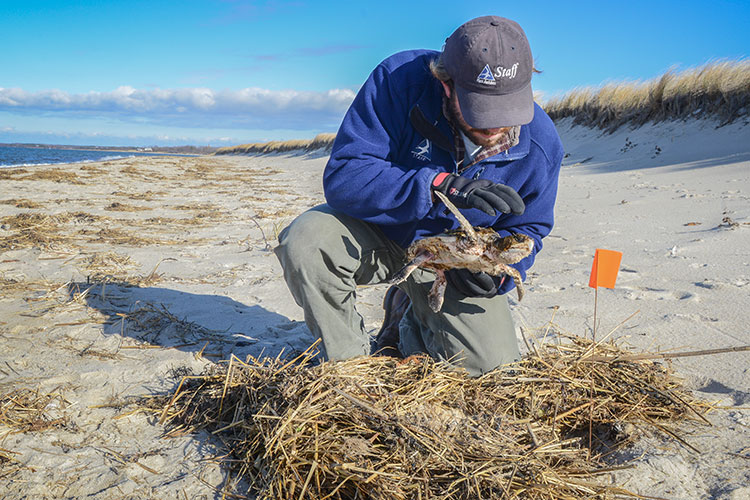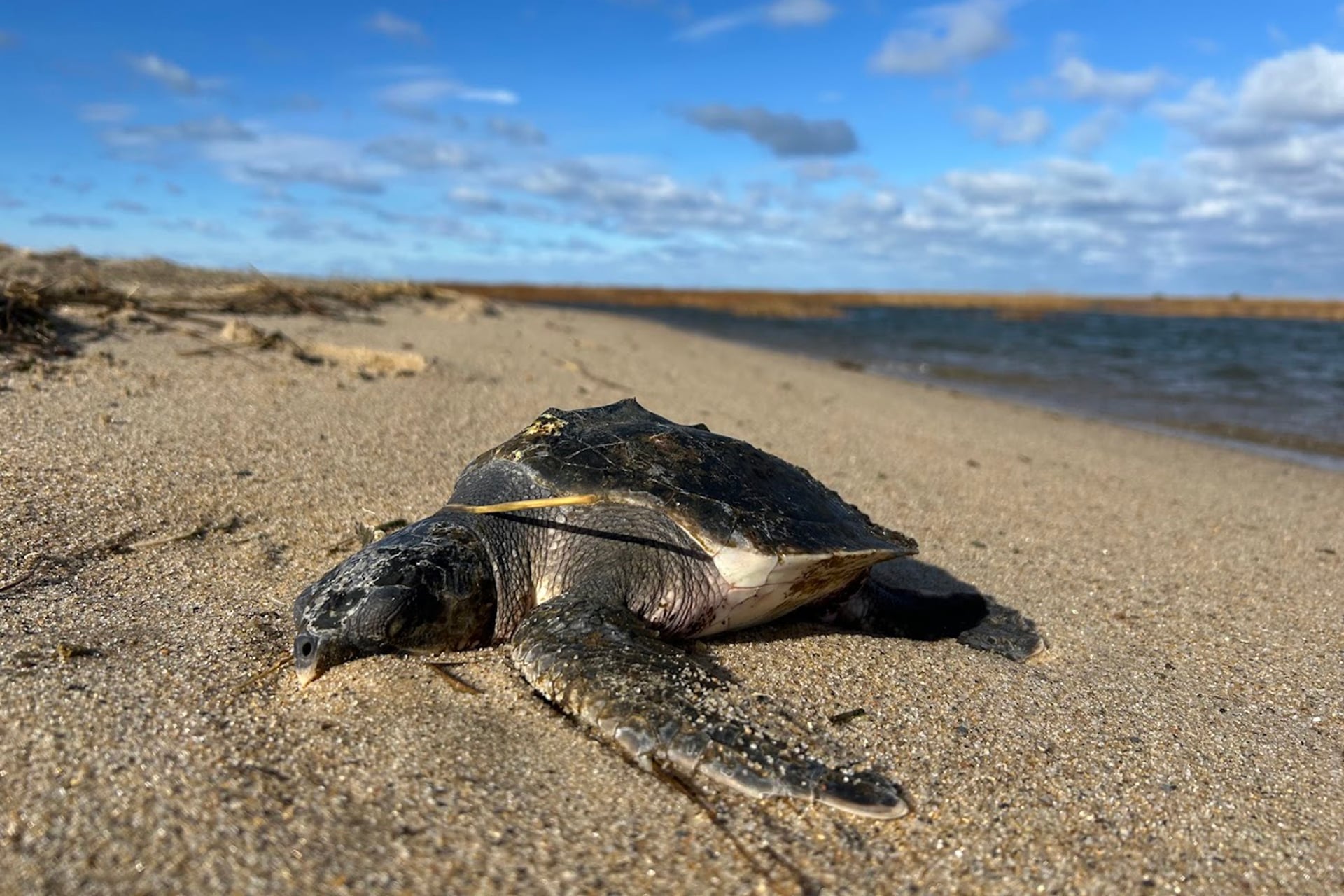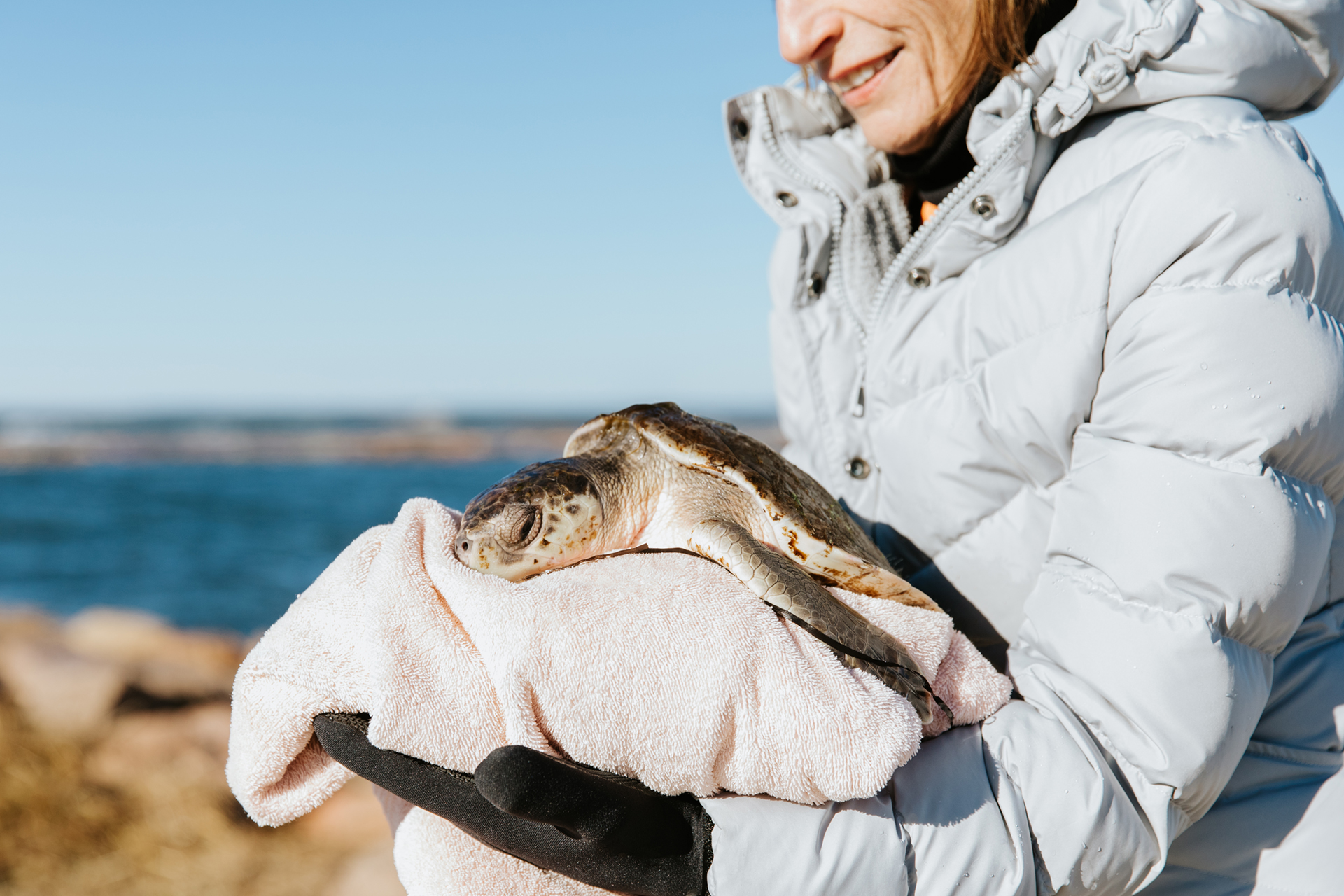Conservation Projects at Wellfleet Bay
Protecting Sea Turtles on Cape Cod
When most people think of sea turtles, they imagine these marine reptiles enjoying the warm waters of the tropics. However, visitors and residents of the Cape may not realize that each summer hundreds of these turtles make their way into Massachusetts waters and the Gulf of Maine, which includes Cape Cod Bay.
While sea turtles in the northwest Atlantic typically don’t nest north of the Carolinas, many sea turtles swim north to feed in our nutrient-rich waters, making good use of the plentiful crabs, jellyfish, and algae.
Sea turtles are difficult to spot, though boaters may be lucky enough to see one basking at the surface or coming up for a breath of air. If you spot a sea turtle during summer, please report it to seaturtlesightings.org. This sightings database helps federal and state researchers and regulators better understand and protect sea turtles.
Sea Turtle Species
The four species of sea turtles in waters around Cape Cod are Kemp's ridley, Loggerhead, Green, and Leatherback. All four are listed as either "Threatened" or "Endangered" under both the U.S. Endangered Species Act and the Massachusetts Endangered Species Act. This means it's illegal to harass them, and you cannot transport them without a permit. Learn more about these sea turtles
Rescuing Cold-Stunned Sea Turtles
Climate change is driving an increase in cold-stunned strandings. Sea turtles are reptiles, and their internal body temperature is mostly regulated by the temperature of the water around them. Warmer waters in summertime mean sea turtles are migrating further north. In the fall, as daylight shortens and water temperatures drop, sea turtles along our coasts begin to make their way south to warmer, sub-tropical and tropical waters. Some of these immature sea turtles become “trapped” by the hooked shape of Cape Cod, and others just don’t move south quickly enough.
As the water continues to cool, turtles become lethargic and hypothermic, in a condition called “cold-stunned,” and they are unable to swim or eat. Onshore winds wash them onto beaches, mostly along the shore of Cape Cod Bay. Cold-stunned sea turtle strandings mainly take place from November to mid-January, beginning when the ocean temperatures fall below 55° F. Most of them are juvenile Kemp’s ridleys, the smallest and rarest of the sea turtles, although Greens and Loggerheads also strand.
It's very important to rescue these stranded turtles as quickly as possible.
Watch Sea Turtle Rescues in Action
Fortunately, all is not lost for these sea turtles! Since 1979, Wellfleet Bay staff and an annual corps of over 200 trained volunteers have patrolled the beaches of Cape Cod, especially at high tide. Day and night, volunteers brace themselves against the windy, cold, and sometimes wet conditions to walk the beaches in search of cold-stunned turtles.
When a turtle is found, volunteers call the Mass Audubon 24-hour hotline. Sea turtle staff members will collect the turtle and bring it to Wellfleet Bay Wildlife Sanctuary where it will be processed and its body temperature will stabilize.
The turtles don't stay at Wellfleet Bay long before they are transported by our volunteers to the New England Aquarium in Quincy or the National Marine Life Center in Buzzards Bay for rehabilitation. There, rescue teams treat them for any injuries and illnesses. It's a long road to recovery for these federally protected marine reptiles, and most will eventually be released back into the wild.
How You Can Help
The number of cold-stunned turtles has increased dramatically in recent decades. This yearly rescue effort wouldn't be possible without both monetary and in-kind donations from our supporters. We hope you'll consider making a donation online—gifts of any size are welcome and very much appreciated! To donate supplies, please call 508-349-2615 or email us.
If You Find a Cold-Stunned Sea Turtle
Do not assume a turtle is dead and do not put it back in the water—turtles that appear lifeless are often still alive. Please note that it's illegal under both state and federal law to harass sea turtles or transport them without a permit.
If you come across a stranded sea turtle on the beach, please follow these simple steps:
- Do not put it back in the water.
- Carefully move the turtle above the high tide line. Never grab or hold the turtle by the head or flippers.
- Cover it completely with seaweed or wrack—never cover it with sand.
- Mark it with an obvious piece of debris like buoys, or driftwood, or draw a big arrow in the sand.
- Call the Wellfleet Bay hotline at 508-349-2615, Option 2, to receive further instructions.
Report Summer Sightings
For boaters, if you see a sea turtle during the summer, please report it to Mass Audubon's website and hotline for boaters, seaturtlesightings.org.
What's New
See MoreCold-Stunned Sea Turtles: The 2025 Rescue Season in Review
Keep ReadingA Dramatic Start to the Cold-Stunned Sea Turtle Season
Keep ReadingAs Stranding Season Begins, Mass Audubon Asks for the Public’s Help in Keeping Sea Turtles Safe
Learn MoreStay Connected
Don't miss a beat on all the ways you can get outdoors, celebrate nature, and get involved.







